
5 minute read
37 THE SECRETS IN
THE SECRETS IN THE SEEDS
Given that seeds are the starting point of the life of plants, it makes sense that they are a great source of nutrition.
Advertisement
Seeds contain a variety of nutrients including amino acids, polyunsaturated and monounsaturated fats, fibre, and minerals including calcium, copper, magnesium and zinc. Research has linked consumption of seeds to a wide range of health benefits, including improved cardiovascular, digestive, immune and bone health, as well as blood sugar balancing and appetite regulation. It’s easy to add seeds into your diet, simply add to granola or top your cereal, salad, soup, smoothie or yoghurt with a sprinkle of seeds for an instant health boost. Be sure to mix your seed consumption up for the best health benefits, and eat a wide, varied and balanced diet to ensure optimum nutrition. Here we pick out our favourite seeds, and share with you their super health properties.
Try: Organic Traditions Black Sesame Seeds
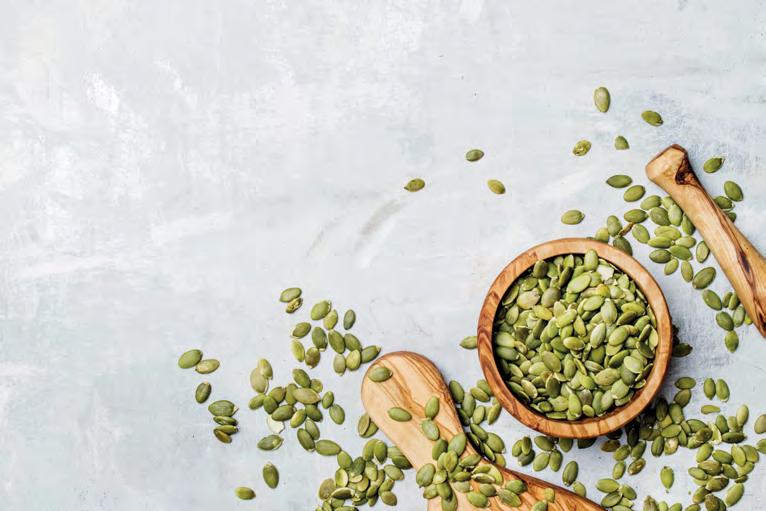
with your favourite sweet or savoury spices. Enjoy on their own or add to smoothies, yoghurt, baking recipes, or salads.
Try: Organic Traditions Pumpkin Kernels
Black Sesame Seeds
With a rich nutty flavour, you may be used to seeing these as an outer coating on certain sushi rolls, or sprinkled on Asian noodle and rice dishes. Black sesame seeds are commonly used in Ayurveda to help manage cholesterol, and offer a good source of certain B-vitamins, calcium, iron, magnesium and phosphorus, and a very good source of copper and manganese. A study of people with high blood pressure found that after one month of consuming 2.5g of black sesame seeds daily (in powdered capsule form), they experience a 6% decrease in systolic blood pressure compared to the placebo group [1]. Top tips for black sesame seeds: add some nutty flavour to salads, or use as a condiment and sprinkle on your Pan -Asian dishes.
Pumpkin Seeds
Pumpkin seeds are a good source of vitamin K and essential minerals including phosphorus, manganese, magnesium, iron, zinc, copper and potassium. They also contain antioxidants, a considerable amount of polyunsaturated fats, vitamin B2 and folate. Diets rich in pumpkin seeds have been linked to reduced risk of certain cancers, including stomach, breast, lung, prostate and colon, and one study of 35 postmenopausal women found that pumpkin seed oil consumption reduced diastolic blood pressure by 7% whilst raising HDL cholesterol levels by 16% [2]. Top tips for pumpkin seeds: soak or sprout in order to reduce phytic acid content, then roast
Baru Seeds
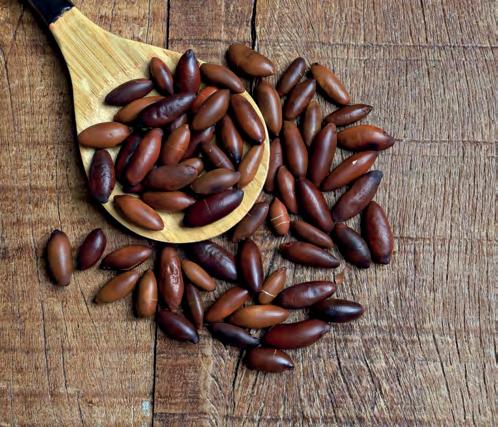
Baru seeds contain considerable amounts of essential fatty acids, fibre, and protein as well as an array of vitamins and minerals such as iron, potassium, zinc and vitamin C. Research shows that they also contain a host of ‘antioxidants’; natural compounds shown to help prevent the damage caused by oxidative stress. For athletes, paleo or keto diet followers, baru seeds are a fantastic addition to meals, not only because of their complete amino acid profile but also because of their lower calorific value and fat
content in comparison to other traditional nuts. Classified as non-allergenic, baru seeds are in fact wild legumes, and are a great addition to your free-from and food allergy shelves. Top tips for baru seeds: roast to make proteins more bioavailable, then eat straight up or add to trail mix, use to make nut butter, granola, or energy balls. Can also be milled into a flour and provide a great alternative to almond flour in baking recipes.
Try: Organic Traditions Roasted Baru Seeds
Top tips for nigella seeds: lightly toast, then grind or use whole in bread and curries, or add to oatmeal, smoothies and yoghurt.
Try: Nature’s Answer Omega-3 Deep Sea Fish & Black Seed Oil Supplement
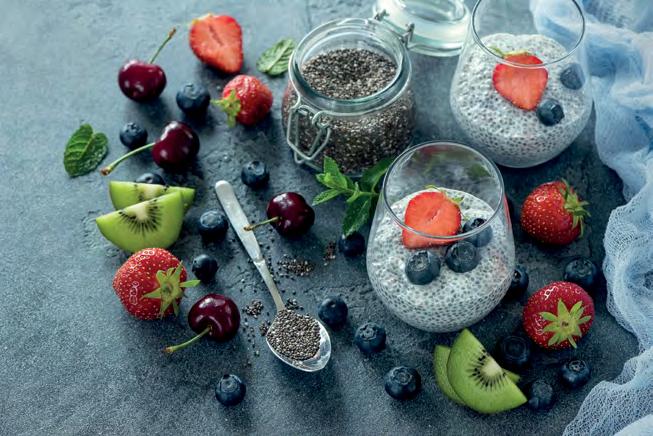
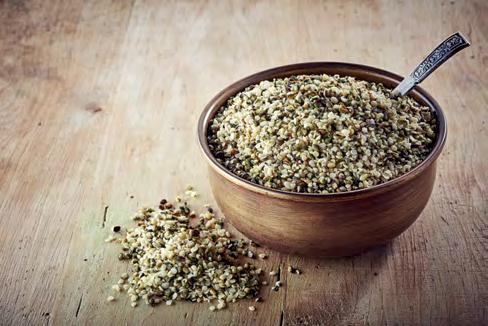
Black Nigella Seeds
Top tips for chia seeds: add some crunchy texture to your porridge, cereal, pasta dishes, smoothies and salads.
Try: Organic Traditions Chia Seeds
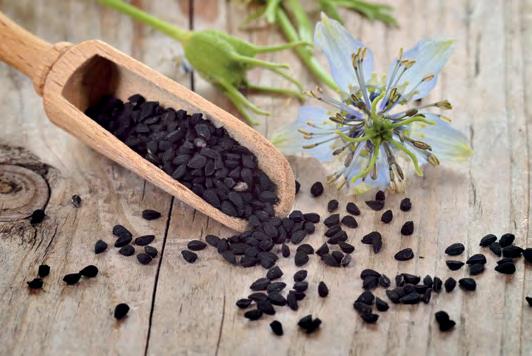
One of the hottest ingredients of the moment in both the kitchen and the health cupboard, nigella seeds (also known as black cumin and by its official name Nigella sativa) have been used for centuries in Persian and middle Eastern cultures for treating a wide variety of health conditions. A review of seven studies found that supplementing with black seeds improved both fasting and average blood sugar levels [3], whilst another study involving 94 people observed that after taking black seed daily for three months subjects experienced significantly reduced fasting blood sugar levels, average blood sugar and insulin resistance.
Chia Seeds
Beside from their omega-3s, chia seeds contain vitamins A, B, E, and D and an array of minerals including: calcium, copper, iron, magnesium, manganese, molybdenum, niacin, phosphorous, potassium, silicon, sodium, sulphur, thiamine, and zinc. Chia seeds are also high in fibre. If you are an athlete, you may wish to consider a little sprinkle of chia. The micro but mighty seed was the original food of Aztec messengers. The gelatinous external layer slows your body’s conversion rate of carbs to sugar, which means sustained energy levels for longer. That said, a study showed no positive effect of chia seed consumption on the performance of endurance exercisers [4] although plasma ALA levels were raised. With ALA being a potent antioxidant, this backs up to some degree the findings of another study that chia seed consumption reduced oxidative stress in vivo [5]. Chia can also hold 12 times its weight of water, so when you are not sprinkling a chia pudding is a great way to rehydrate!
Hempseed
Hempseed is the richest known source of polyunsaturated fats, containing a perfect 3:1 ratio of omega-6 linoleic acid and omega-3 linoleic acid. In fact, the hemp seed balance of Omega 3 to 6 fats is the perfect proportion for human dietary needs, making hemp an ideal addition to a healthy diet and lifestyle. Hempseed is considered by leading researchers and medical doctors to be one of the most nutritious food sources on the planet. Shelled hempseed is packed with 33% pure digestible protein (66% of which is edestin), and unlike some other plantbased proteins, hemp protein is highly digestible [6]. Hempseed is also rich in iron and vitamin E, containing three times the vitamin E of flax. Top tips for hempseed: eat on their own raw, or roast with spices for extra flavour. Add to salads and soups for a nutty flavour.
Try: Organic Traditions Hemp Hearts
REFERENCES
[1] https://www.ncbi.nlm.nih.gov/pubmed/21827664, [2] https://www.ncbi.nlm.nih.gov/pubmed/21545273, [3] https://www.ncbi.nlm.nih.gov/ pubmed/29154069, [4] https://www.ncbi.nlm.nih.gov/pubmed/25988762, [5] https://www.ncbi.nlm.nih.gov/pubmed/28455051, [6] https://www. ncbi.nlm.nih.gov/pubmed/20977230.










